Thursday, April 3, 2025. Annette’s Roundup for Democracy.
Some GOP Senators Break With Trump to Reject Canada Tariffs.
Senate passes resolution to undo emergency declaration, but measure has been blocked in the House.
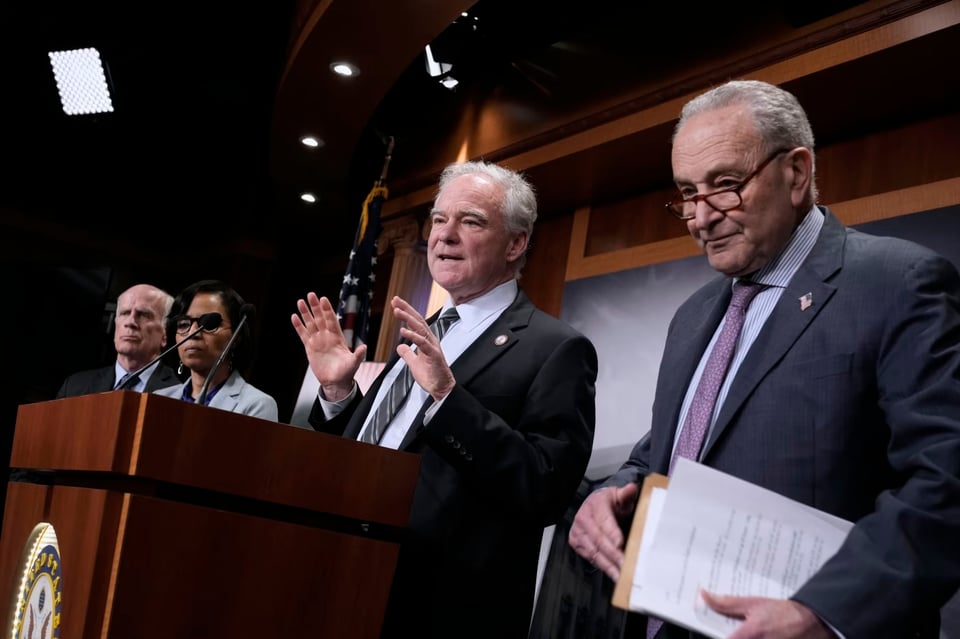
Sen. Tim Kaine pushed a resolution that would end an emergency declaration President Trump used to impose tariffs on Canadian goods.
WASHINGTON—A handful of Republicans broke with President Trump on trade policy, joining with Democrats to pass a resolution aiming to undo the president’s 25% tariff on Canadian imports.
The resolution, led by Sen. Tim Kaine (D., Va.), would end an emergency declaration Trump used to impose tariffs on Canadian goods.
The vote was largely symbolic. Under federal law, Congress has the power to cancel national emergencies declared by the president, but the current proposal has been blocked in the GOP-led House, and Trump could veto any measure that makes it to his desk.
The Senate vote, which passed 51 to 48, took place just hours after Trump imposed a 10% baseline tariff on all imports to the U.S., and higher rates for some nations.

Senators Rand Paul, Susan Collins, Lisa Murkowski, and Mitch McConnell.
Sens. Susan Collins of Maine, Lisa Murkowski of Alaska and Rand Paul and Mitch McConnell of Kentucky joined with all Democrats in backing the resolution. Paul, who is a co-sponsor of the bill, has argued that tariffs are a tax and that only Congress—not the president—can impose taxes under the Constitution.
“This is a tax, plain and simple, on the American people,” Paul said. “You can’t simply declare an emergency and say, ‘Well, the constitutional republic was great, but gosh, we’ve got an emergency and times are dire.’ ”
Paul clapped after the vote tally was final, as a beaming McConnell—the former party leader who has long had a bumpy relationship with Paul—stood next to him.
The Canada measure tested how many Republicans were willing to say Trump has gone too far in launching a trade war with a close ally—and offered a chance to signal disaffection with his policies more broadly.
Senate Majority Leader John Thune (R., S.D.) has worked to stop defections, telling Senate Republicans to stay in line behind the party’s standard-bearer and vote against the resolution. While Republicans have a 53-47 Senate majority, the unified GOP front is starting to crack as Republicans in some states—particularly those with agricultural interests or ties to Canada—warn about voter backlash.
The vote is an important marker because so far this year Republicans have rarely crossed Trump, even though he has slashed government programs that many in the GOP support and muscled through cabinet officials unpopular with some GOP lawmakers.
Ahead of the vote, Trump took to his social-media site to attack Republicans who had been reported to be siding with Democrats, saying that they have “been extremely difficult to deal with” and “unbelievably disloyal” to Thune and the Republican Party. He said that his measure was an attempt to stop the flow of fentanyl into the U.S., one of the rationales he has repeatedly leaned on in his argument for tariffs on goods from Canada and Mexico. Data from U.S. Customs and Border Protection show that fentanyl predominantly enters the U.S. through the southern border.
A 25% import tariff on goods from Mexico and Canada took effect March 4, with an exception for energy products and potash, which received a 10% tariff. The Trump administration later suspended those tariffs until April 2 on autos and all other goods that were eligible for duty-free trade under the U.S.-Mexico-Canada Agreement, or USMCA.
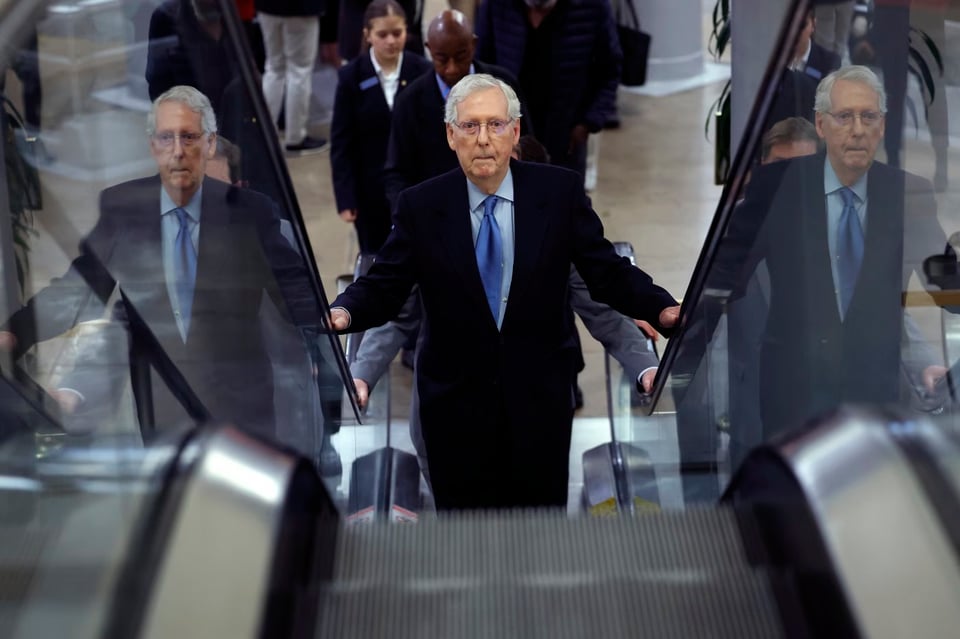
Sen. Mitch McConnell has indicated he will back the resolution that aims to undo Trump’s 25% tariff on Canadian imports
Collins said tariffs would inflict harm on Maine, which she said imports home-heating oil and gasoline from Canada, as well as potash, a fertilizer for potato growers. In turn, Maine sends its blueberries and lobsters to Canada for processing.
“The fact is, that if we impose these tariffs on Canadian processing, it’s going to be our Maine lobstermen who will bear the cost. It’s going to be consumers who bear the cost,” Collins said. She said that Canadian tourists have already begun canceling vacation trips to her state.
Sen. Ron Johnson (R., Wis.) opposed the resolution, calling it a Democratic ploy. “I’m not going to participate in trying to damage Trump or poke a stick in his eye,” Johnson said.
The House has taken a step to tie its own hands, inserting language in a procedural measure that prevents it from using the powers it has to cancel the Feb. 1 tariffs. There are still pathways for the resolution in the House, albeit unlikely ones. GOP leadership could decide to bring the measure to the floor, or rank-and-file members could try to force a vote on a similar or identical measure using a discharge petition, if they collected 218 signatures.
During Trump’s first term, Congress unsuccessfully tried to override an emergency declaration issued by him in 2019, when both the House and the Senate voted to terminate the national emergency he had declared at the U.S.-Mexico border. He had used the move to transfer money from the military and other sources to construct a wall at the border. Trump vetoed the measure.
At the time, the measure was the first of its kind to pass since lawmakers in 1976 wrote the National Emergencies Act, which allows Congress to terminate an emergency declaration. (Wall Street Journal)
More are coming.
“One crop away from bankruptcy”
— Republicans against Trump (@RpsAgainstTrump) April 2, 2025
Republican Senator Thom Tillis warns Trump’s tariffs will do “irreparable” damage to farmers. pic.twitter.com/v0MhsvL1ld
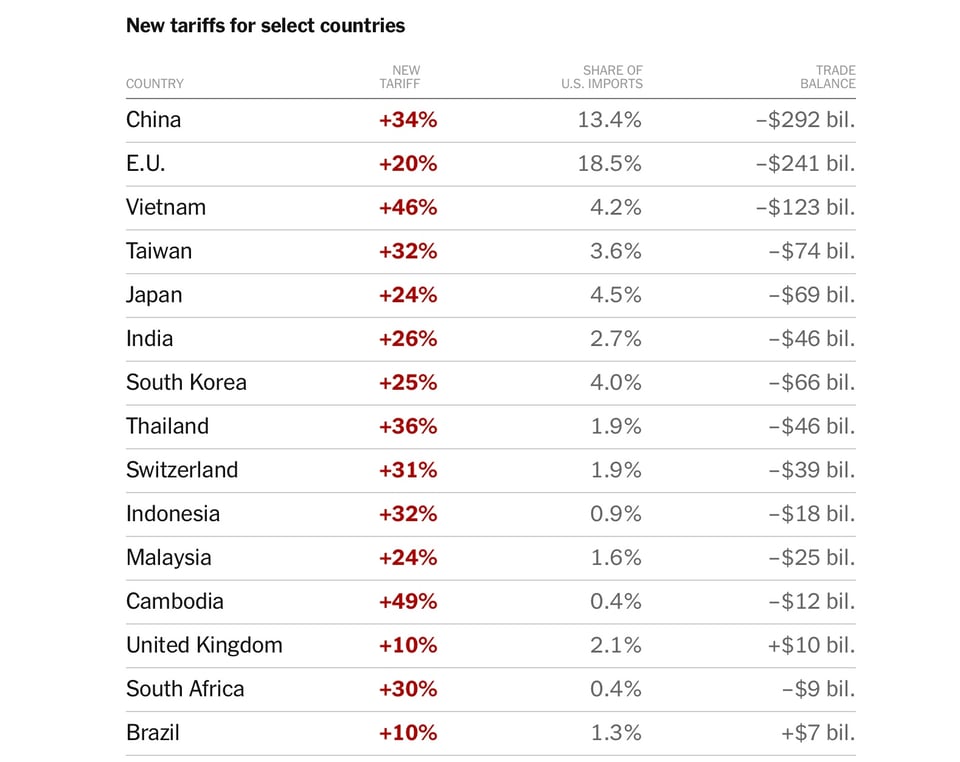
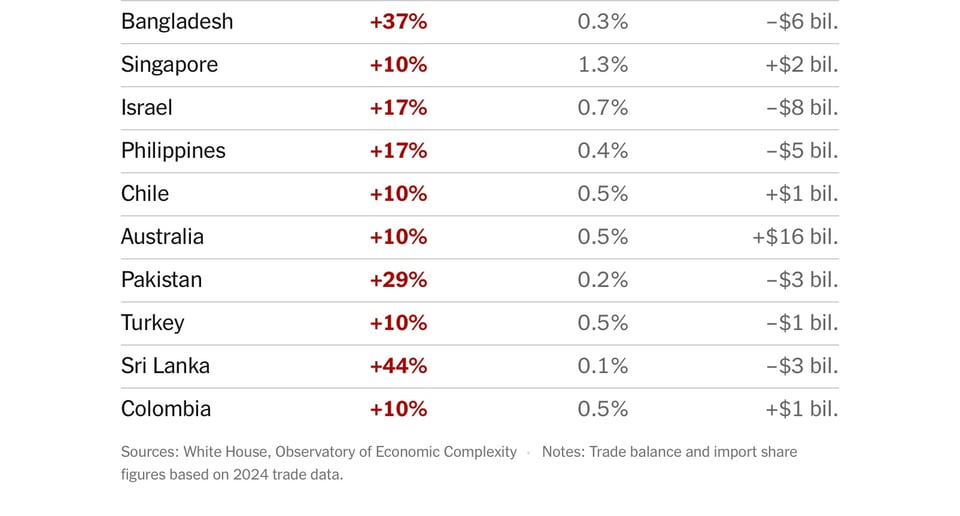
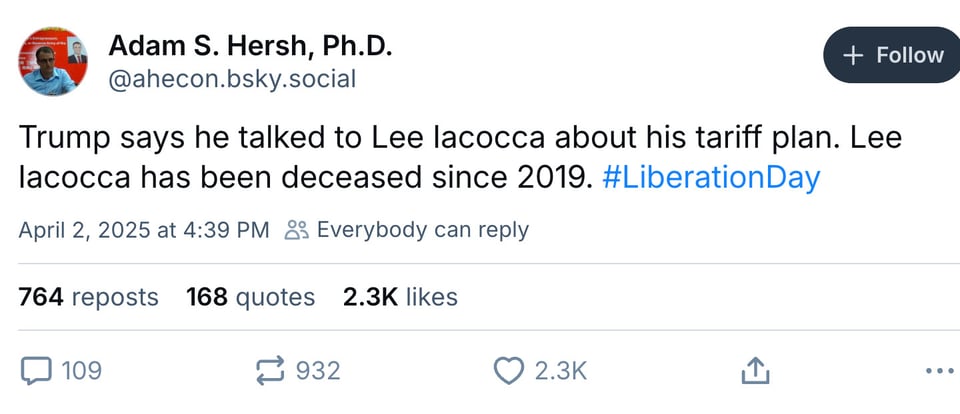
The Trump administration has put a 10 percent tariff on the Heard Island and McDonald which has a population of 0 people and is inhabited only by penguins. pic.twitter.com/KCmb9nBIYD
— WarMonitor🇺🇦🇬🇧 (@WarMonitor3) April 2, 2025

The Trump Tariff Tax is the largest peacetime tax hike in U.S. history. These Tariffs are nearly 10x the size of those imposed during the Trump-Pence Administration and will cost American families over $3,500 per year. Check Out“Spoiling America’s Golden Age”@AmericanFreedom 👇 pic.twitter.com/2NghyDc8c1
— Mike Pence (@Mike_Pence) April 2, 2025
“President Trump is focused on what teams American transgender athletes can race on, and China is focused on transforming its factories with A.I. so it can outrace all our factories.”-Thomas Friedman, New York Times.
Just in case you are thinking Republicans are normal, this also happened yesterday.👇
Touch to watch.
Republican Congressman quotes Joseph Goebbels in hearing: pic.twitter.com/hoCeMupSwF
— Drew Pavlou 🇦🇺🇺🇦🇹🇼 (@DrewPavlou) April 2, 2025
Take a news break.
Here is a sports 🏀 ⚽️🎾🥎 update.
Hopkins to join Ivy League in 2026
In a stunning press conference on Sunday, March 30, Vice President of Student Athlete Relations Chad Rockeley-DuPont announced that Hopkins is set to join the Ivy League conference for the 2026–2027 academic year, replacing Dartmouth College. Hopkins will remain a part of the Centennial Conference until the end of this academic term and will play the 2025–2026 season as an independent team before making the transition into the Ivy League.
This announcement comes after years of Hopkins making mincemeat out of Division III (D-III) competition while moving up the U.S. News and World Report’s academic rankings. While it is currently unclear whether this decision was made for athletic or academic reasons, either is defensible.
In an email to The News-Letter following the press conference, Deputy Spokesperson of the Ivy League Sylvester Spoons expressed her excitement on behalf of the universities.
“We are delighted that John Hopkins is bringing its academic talent and athletic prowess to the Ivy League,” she wrote, misspelling the University’s name.
Spoons did not address Dartmouth’s unexpected exit from the conference after nearly 70 years. The News-Letter reached out to Dartmouth’s athletic program regarding the situation but did not receive a response at the time of publication.
Hopkins is highly regarded academically, as it is currently ranked as the #6 best school in the country according to U.S. News and World Report. This puts them above the majority of the Ivy League, only trailing the holy trinity: Princeton University, Harvard University and Yale University.
However, Spoons did comment on changes that Ivy League members expect from Hopkins as the University takes on this new venture.
“Well, they have the academics,” she remarked, “and sports will catch up, too — eventually. But what Hopkins needs to work on is their vibe: Depressed, burned-out nerds is not what we like here at the Ivy League. We’re cool, and we know it.”
In terms of Hopkins Athletics, specifically, athletes have been demanding more vigorous competition. The Blue Jays have won back-to-back Director’s Cups, an annual award given to the best D-III athletic school across all sports, and have a commanding lead in the 2024–2025 school year in their quest for a three-peat.
Hopkins has many advantages over the rest of the D-III; starting with the most obvious, we are a larger school in comparison to most of our Centennial Conference rivals. Most D-III schools have between 1,000 to 2,000 students, while Hopkins boasts an undergraduate population of just over 6,000 students, making them more comparable in size to a small Division I school (D-I).
The University also has significant recruiting advantages, due to the allure of highly-ranked academic programs, as well as the ability to bring in graduate students who are older and have already proved themselves at the college level. While these may be advantages currently for the University, in the Ivy League, they are simply par for the course.
This announcement has not been well-received by all. Hopkins lacrosse, currently the only D-I team on campus, currently competes in the Big Ten Conference, and their fate in the Ivy League is uncertain. Rockeley-DuPont addressed these concerns in the press conference.
“We appreciate the Big Ten conference for providing a competitive environment for our lacrosse program,” he said before announcing that Hopkins lacrosse would remain in the Big Ten for two seasons before switching to the Ivy League Conference in 2026–2027, along with the rest of the University.
This change could have far-reaching impacts on student life. Hopkins, which already has a 7% acceptance rate, will likely become even harder to get into due to the added prestige of the Ivy League.
There’s also the question of adding sports. The University is missing many sports that the Ivy League teams compete in, such as rowing and gymnastics; only time will tell if Hopkins is looking to expand its athletic program to better align itself with its new conference. In a fast-changing collegiate athlete world, there is also the question of how NIL, recruiting and graduate students will impact Hopkins.
Perhaps most intriguing is the question of how Hopkins will fare in their new conference. Despite dominating D-III competition in almost every sport, the jump up to D-I is a large one. Ivy League teams are expected to play out-of-conference schedules against Power Four teams, and seeing how the dust settles on the University’s first couple D-I seasons will be fascinating.
As Hopkins prepares for this monumental transition, questions remain about how the school will adapt to the demands of Ivy League competition, both athletically and academically. But, with a history of excellence in both fields, we have every confidence that the Blue Jays will rise to the occasion, and 2026 will mark a new era for Hopkins sports. GO JAYS! (Johns Hopkins University Newsletter).
# Hope you allowed yourself a one day gloat.

